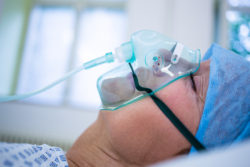
It’s sometimes also used as a mood stabilizer for patients with bipolar disorder. It’s been on the market since 1994, when the FDA first approved it for use in the U.S.
Although Lamictal has demonstrated effectiveness, it also puts patients at risk for developing Stevens Johnson Syndrome, or SJS.
A Lamictal SJS reaction that starts with flu-like symptoms may soon progress to attack the skin and mucous membranes, requiring days or weeks of hospitalization and threatening the patient’s life.
Fortunately, SJS is rare. However, when it does happen, it puts the patient at a significant risk for severe and life-threatening complications.
Typically, a Lamictal SJS reaction can begin with a rash that starts on the trunk and soon spreads to the head and limbs. Areas of skin affected by this rash may blister and peel away.
SJS can also cause lesions in the mucous membranes throughout the digestive or respiratory tracts.
Patients may suffer from cough, diarrhea or respiratory distress, and lesions in the mouth or throat may make it difficult to eat. The patient may develop conjunctivitis in the eyes. Corneal damage can threaten to leave the patient blind.
Lesions both inside and outside the body can lead to dehydration, systemic infection, shock, or organ failure.
Most cases of SJS appear to originate as an adverse reaction to one of many different kinds of drugs.
Anti-epileptics like Lamictal have been known as a group to lead to cases of SJS. Less frequently, cases of SJS have been linked to infections or cancer. In some cases, no cause can be identified.
Toxic epidermal necrolysis, or TEN, is considered an even more severe manifestation of SJS.
The significant difference between the two conditions is the amount of skin affected: SJS typically causes skin detachment on less than 10 percent of the body surface area, and TEN leads to detachment over 30 percent or more. Anything in between is considered overlap.
Case Study: Lamictal SJS Reaction
One case study published in the Pakistan Journal of Medical Sciences in 2013 documents the experience of a 56-year-old lady who developed SJS after taking Lamictal (referenced in the study by its generic name lamotrigine).
The patient had been prescribed Lamictal after other attempts at treating her depression had not succeeded. For the first few weeks after she started taking Lamictal, her psychiatric symptoms showed significant improvement.
But a little over two weeks after being discharged from the hospital, she broke out in a Lamictal SJS reaction that manifested as papules and eruptions all over her body.
Her outer layer of skin began to detach on the palms of her hands and the soles of her feet. Her mucous membranes were also affected with conjunctivitis in her eyes and lesions inside her mouth.
As her symptoms got worse, she had to be treated in an intensive care unit. She began to recover after her doctors discontinued her Lamictal and other psychiatric medications. It took her about two weeks to make a full recovery.
Do YOU have a legal claim? Fill out the form on this page now for a free, immediate, and confidential case evaluation. The Stevens Johnson Syndrome attorneys who work with Top Class Actions will contact you if you qualify to let you know if an individual lawsuit or class action lawsuit is best for you. [In general, SJS lawsuits are filed individually by each plaintiff and are not class actions.] Hurry — statutes of limitations may apply.
ATTORNEY ADVERTISING
Top Class Actions is a Proud Member of the American Bar Association
LEGAL INFORMATION IS NOT LEGAL ADVICE
Top Class Actions Legal Statement
©2008 – 2024 Top Class Actions® LLC
Various Trademarks held by their respective owners
This website is not intended for viewing or usage by European Union citizens.
Get Help – It’s Free
Help for Victims of Stevens Johnson Syndrome
If you or a loved one were diagnosed with Stevens Johnson Syndrome (SJS) or toxic epidermal necrolysis (TEN) after taking a prescribed or over-the-counter medication, you may be eligible to take legal action against the drug’s manufacturer. Filing an SJS lawsuit or class action lawsuit may help you obtain compensation for medical bills, pain and suffering, and other damages. Obtain a free and confidential review of your case by filling out the form below.
An attorney will contact you if you qualify to discuss the details of your potential case at no charge to you.
Please Note: If you want to participate in this investigation, it is imperative that you reply to the law firm if they call or email you. Failing to do so may result in you not getting signed up as a client, if you qualify, or getting you dropped as a client.
Oops! We could not locate your form.












